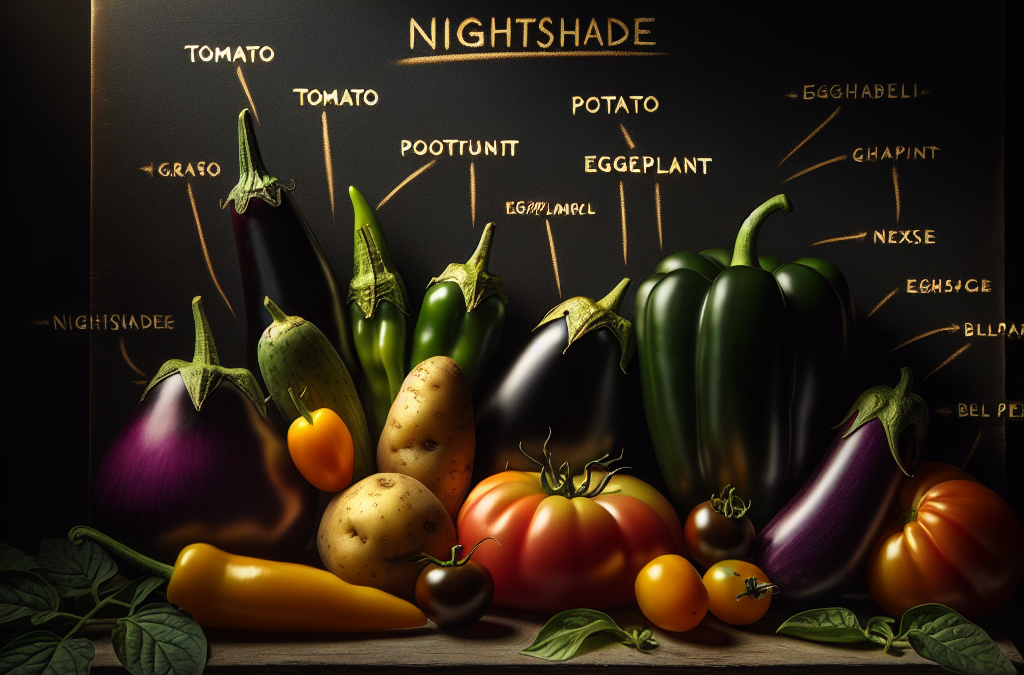What Are Nightshade Vegetables?
Defining Nightshades
So first off, let’s get into what nightshade vegetables really are. Nightshades belong to the Solanaceae family, which includes a variety of both edible and inedible plants. You might be more familiar with some like tomatoes, eggplants, peppers, and potatoes. Quite a mixed bag, right? These veggies have certain alkaloids that can be beneficial but might also be a concern for some folks.
As someone who loves cooking with fresh ingredients, I’ve come to appreciate how these vegetables can add vibrant colors and flavors to a dish. They’re not just pretty; they can provide a whole host of nutrients too. However, understanding their complexities is super important for anyone considering their health impacts!
It’s fascinating to think about how these plants have been cultivated and consumed for centuries in different cultures, adding a rich history to our dining tables. Whether you’re a fan of spicy peppers or love a classic tomato sauce, it all connects back to the diverse world of nightshades.
Health Risks Associated with Nightshades
Allergies and Sensitivities
Trust me, I’ve been down the rabbit hole of food sensitivities. Some people may find that nightshade vegetables trigger allergies or digestive issues, which can be a real bummer if you love a good salsa. If you’ve ever experienced bloating after indulging in a hearty pasta with tomato sauce, you might want to consider if nightshades are the culprit.
It’s quite common for individuals with autoimmune disorders to report intolerance to these veggies. I spoke to a friend who was diagnosed with arthritis; the moment she cut nightshades from her diet, she noticed a big difference. It’s always a journey understanding one’s own body!
If you think you might be sensitive, it’s worth documenting your food intake and symptoms. Sometimes it’s not just the food itself but how it interacts with your body. Keeping a food diary has helped me pinpoint the foods that make me feel less than awesome, and trust me, it’s a game changer.
Potential Benefits of Nightshade Vegetables
Nutritional Value
On the flip side, let’s dive into the benefits! Nightshade vegetables are rich in vitamins and antioxidants. For instance, bell peppers, especially the red ones, are packed with vitamin C and are a great addition to your salads and stir-fries. I can’t get enough of those colorful peppers in my kitchen!
They also contain lycopene and anthocyanins, which are powerful antioxidants that help combat oxidative stress in the body. Trust me, the more vibrant the color, the better the nutrient punch it usually packs. Tomatoes, with their beautiful red hue, can help heart health—how cool is that?
Incorporating these veggies can also lead to a more balanced diet. Since they are low in calories but high in nutrients, they’ve become a staple in my meals. Pairing nightshades with proteins and complex carbs can create a well-rounded dish that’s satisfying and good for you.
How to Cook with Nightshade Vegetables
Cooking Techniques
Cooking with nightshade vegetables is all about embracing creativity in the kitchen. From roasting to grilling, the possibilities are endless! I love tossing my eggplants in olive oil, seasoning them up, and roasting them until they’re crispy and golden—yummy!
Get an Amazing Discount on the Best Certified Organic Whole Food Supplement!
If you’re looking to enhance the flavors, marinating your nightshades can really take them to the next level. For instance, making a salsa with fresh tomatoes and herbs gets everyone coming back for seconds at my summer BBQs. It’s such a crowd-pleaser!
Don’t forget about versatility! You can blend nightshades into sauces, purees, or even smoothies (yes, really!). A little creativity goes a long way in making your meals exciting and visually appealing. Experimenting with different cooking methods has definitely paid off for me.
Incorporating Nightshade Vegetables into Your Diet
Meal Planning Tips
When planning meals, I always try to include at least one nightshade vegetable each day. It’s a simple way to boost nutrition without even thinking about it. I often throw in some roasted tomatoes in my omelets or whip up a spicy pepper relish for my sandwiches.
One of my go-to tricks is batch cooking. I love making a big pot of ratatouille using a mix of zucchini, bell peppers, and eggplants for a ready-to-go dish throughout the week. It saves time and ensures I’m never stranded without something nutritious to eat.
And let’s not forget about snacking! Sliced bell peppers with hummus are a crunchy, satisfying snack. They’re not just healthy but super easy to prepare, making them perfect for busy days when I need a quick fix without the guilt.
Frequently Asked Questions
1. What are some common nightshade vegetables?
Some well-known nightshade vegetables include tomatoes, potatoes, eggplants, and bell peppers. These are staples in many kitchens around the world!
2. Can nightshade vegetables cause inflammation?
For some people, particularly those with autoimmune conditions, nightshade vegetables can contribute to inflammation. It’s important to listen to your body and consult a healthcare professional if you notice adverse effects.
3. Are there any benefits to eating nightshade vegetables?
Absolutely! Nightshade vegetables are rich in vitamins, antioxidants, and various beneficial compounds that can support overall health. They can enhance your meals with flavors and colors while providing essential nutrients.
4. How can I incorporate nightshade vegetables into my diet?
You can add nightshades to your meals in various ways—like in salads, cooked dishes, or as snacks. Experimenting with different cooking techniques is key to making them a delicious part of your diet!
5. Should I avoid nightshade vegetables altogether?
Not necessarily! While some people may need to limit their intake due to sensitivities, many can enjoy them without any issues. It’s all about finding balance and what works best for your body.





